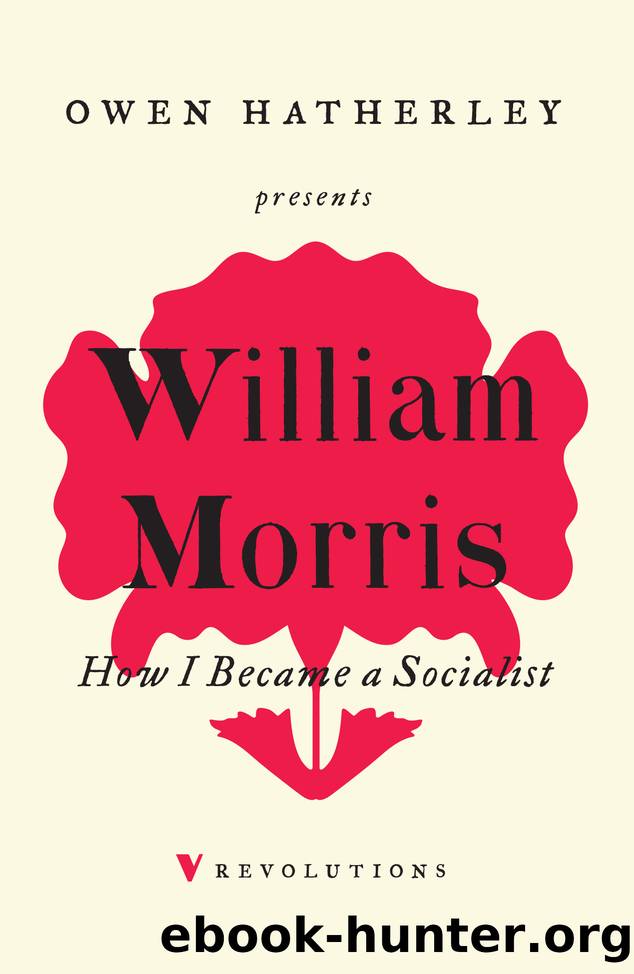How I Became a Socialist by William Morris

Author:William Morris
Language: eng
Format: epub
Publisher: Verso Books
_______________
* Read at the Conference convened by the Fabian Society at South Place Institute, June 11, 1886. [Ed.: These notes were added by Morris for publication of Signs of Change (1888)].
â They have been ârather roughâ, you may say, and have done more than merely hold their sentimental position. Well, I still say (February 1888) that the present open tyranny which sends political opponents to prison, both in England and Ireland, and breaks Radical heads in the street for attempting to attend political meetings, is not Tory, but Whig; not the old Tory âdivine right of kingsâ, but the new Tory, i.e., Tory-tinted Whig, âdivine right of propertyâ, made Bloody Sunday possible. I admit that I did not expect in 1886 that we should in 1887 and 1888 be having such a brilliant example of the tyranny of a parliamentary majority; in fact, I did not reckon on the force of the impenetrable stupidity of the Prigs in alliance with the Whigs marching under the rather ragged banner of sham Toryism. [On 13 November 1887, a day that came to be known as âBloody Sundayâ, the Metropolitan Police commissioner Charles Warren ordered his officers violently to disperse a large number of free-speech demonstrators, including a contingent from Morrisâs Socialist League. Morris had participated in and helped to organ-ise the demonstration, and he wrote âA Death Songâ (1887) in commemoration of Alfred Linnell, one of the demonstrators who had been heavily injured as a result of the police violence, and who later died of his injuries. Morrisâs report of the events is titled âLondon in a State of Siegeâ, Commonweal 3: 97 (19 November 1887), pp. 369â70.]
* As true now (February 1888) as then: the murder of the Chicago Anarchists, to wit. [On 4 May 1886, a demonstration in support of an eight-hour working day and against police brutality took place in Haymarket Square, Chicago. On 3 May, police had killed a striking worker at the McCormick Harvesting Machine Company, and had injured several others. As police dispersed the demonstration on 4 May, an unknown person threw a dynamite bomb at the police, killing seven police officers and four civilians. Eight anarchists were arrested and charged with conspiracy, though no firm evidence was produced to suggest that any of those arrested had, in fact, thrown the bomb, and some were not even present on the day. Nonetheless, seven of the anarchists were sentenced to death, and one to fifteen years in prison. Two of the sentences were commuted to life imprisonment, and one of the anarchists committed suicide in prison. The remaining four anarchists were hanged on 11 November 1887. Morris condemned the âcold-blooded judicial murderâ of the Chicago prisoners in âFree Speech in Americaâ, Commonweal 3: 91 (8 October 1887), p. 324.]
Download
This site does not store any files on its server. We only index and link to content provided by other sites. Please contact the content providers to delete copyright contents if any and email us, we'll remove relevant links or contents immediately.
International Integration of the Brazilian Economy by Elias C. Grivoyannis(57275)
The Radium Girls by Kate Moore(10901)
Turbulence by E. J. Noyes(7031)
Nudge - Improving Decisions about Health, Wealth, and Happiness by Thaler Sunstein(6629)
The Black Swan by Nassim Nicholas Taleb(6182)
Pioneering Portfolio Management by David F. Swensen(5599)
Rich Dad Poor Dad by Robert T. Kiyosaki(5140)
Zero to One by Peter Thiel(4816)
Man-made Catastrophes and Risk Information Concealment by Dmitry Chernov & Didier Sornette(4728)
Secrecy World by Jake Bernstein(3773)
Millionaire: The Philanderer, Gambler, and Duelist Who Invented Modern Finance by Janet Gleeson(3565)
Skin in the Game by Nassim Nicholas Taleb(3455)
The Age of Surveillance Capitalism by Shoshana Zuboff(3411)
The Money Culture by Michael Lewis(3276)
Skin in the Game: Hidden Asymmetries in Daily Life by Nassim Nicholas Taleb(3259)
Bullshit Jobs by David Graeber(3171)
The Dhandho Investor by Mohnish Pabrai(3161)
The Wisdom of Finance by Mihir Desai(3069)
Blockchain Basics by Daniel Drescher(2883)
